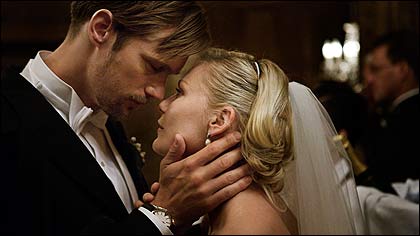
We All Fall Down
Lars Von Trier divines the apocalypse in Melancholia
MELANCHOLIA: Written and directed by Lars Von Trier. Cinematography, Manuel Alberto Claro. Editor, Morten Hojbjerg & Molly M. Stensgaard. Music, Kristian Eidnes Andersen. Starring Kirsten Dunst, Charlotte Gainsbourg, Alexander Skarsgard, Stellan Skarsgard, Kiefer Sutherland, Brady Corbet, Charlotte Rampling, John Hurt, Udo Kier. Magnolia Pictures, 2001. R. 136 minutes. Four and a half stars.
 |
Say what you will about Danish director Lars von Trier — genius, nutcase, anti-Semite, asshole savant, auteur, hack — just don’t call him irrelevant. The man is a lightning rod of controversy, and his challenging, aggressively experimental films divide audiences like a machete coming down on a melon.
As a filmmaker, von Trier appears incapable of frivolity and artistic small talk, which is not to say he lacks a sense of humor; he is a supreme ironist with an instinct for the darkly absurd. Like such disparate but ambitious directors as Kubrick, Fassbinder and Cassavetes before him, von Trier wields his camera as a combination weapon and paintbrush, a blunt, sometimes brutalizing instrument of inquiry aimed at the ontological heart of existence. He is a serious (sometimes too serious) artist: Hurt is his subject, reality is his medium, and grace, albeit secular, is his goal. Arguably.
Melancholia is the name of the big, blue planet that, in von Trier’s latest film, has been hiding behind our sun, and whose asymptotic orbit is bringing it, according to some scientists, on a collision course with Earth. The premise is a familiar one, usually calling for the aeronautic heroics of Bruce Willis or the staid presidential decision-making of Morgan Freeman launching a payload of uranium toward the invading asteroid.
Hollywood disaster films, from Earthquake to Armageddon, are the cinematic equivalent of rollercoaster rides, meant to terrify, titillate but ultimately restore us, reassured, to safety; von Trier’s film is about as reassuring as a round of Russian roulette. Like Tarkovsky’s Sacrifice or Jeff Nichol’s more recent Take Shelter, Melancholia is a psychological drama that pushes its characters up against the very real possibility of apocalypse. “No more happy endings,” von Trier has said. Think of Melancholia, then, as Ingmar Bergman at the end of the world.
Following an operatic prelude that is visually stunning and emotionally unnerving, the film divides into two chapters: “Justine” and “Claire,” the names of two sisters played, superbly, by Kirsten Dunst and Charlotte Gainsbourg, respectively. These siblings provide the stark psychological poles of Melancholia: Claire is practical but fragile, a wife and mother grasping after some modicum of normality amid life’s chaos; Justine, whose doomed wedding night opens the film, is an open wound, a nerve scraped raw — her erratic behavior belies an utter lack of illusion and loss of faith, be it faith in love, marriage, religion, life, even the necessity of humanity. “Life on Earth is evil,” Justine tells her despairing sister in one of the movie’s more harrowing scenes. “When I say we’re alone, we’re alone. Life is only on Earth, and not for long.”
After Justine’s nuptials to Michael (Alexander Skarsgard) go gloriously to hell — the wedding guests flee the reception as from a house afire — the family collapses meekly upon itself. Their solitude is both claustrophobic and spiritually arid. The days telescope with pain. Claire’s husband, John (Kiefer Sutherland), who grudgingly financed and hosted Justine’s wedding on a remote rural estate (exteriors were shot at Sweden’s majestically creepy Tjoloholm Castle), is an amateur scientist who is convinced Melancholia — that ghostly orb looming ever-larger in the sky — will pass by safely. Consumed by fear and anxiety, Claire clings to her husband’s certainty, while Justine remorselessly mocks her sister’s desperate need for the solace of fairy tales.
This sibling struggle, veering toward tragedy, is amplified, diminished and, finally, subsumed by the planet filling the sky — and the screen — like the banal face of annihilation, a truth to be feared, denied or fatally embraced. Melancholia strikes a note of mortal reckoning similar to that of Poe’s “Masque of Red Death,” where the pomp and circumstance of life’s rich pageant only serves to blind its victims to the doom enveloping them. No more happy endings.
Brilliantly, with great subtlety and restraint — and, in his use of soundtrack music and special effects, breaking his own Dogme 95 rules — von Trier traipses a tightrope, balancing despair and hope while never toppling into nihilism. He is helped by an excellent cast of veteran actors — Charlotte Rampling, Stellan Skarsgard, John Hurt, Udo Kier — whose collective efforts lend the proceedings a disconcerting rhythm of the mundane, making the threat of Armageddon all the realer, and scarier.
In the end, von Trier demolishes his own narrative — crushes every symbol, strips every illusion, upends every analogy — until we are left bereft and yet somehow exhilarated by the film’s vision: Whether a near miss or direct hit, our lives are ever in the orbit of melancholia.
Melancholia is now playing at the Bijou; bijou-cinemas.com or 686-2458.